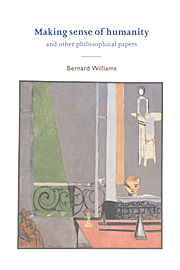Book contents
- Frontmatter
- Contents
- Preface
- I Action, freedom, responsibility
- II Philosophy, evolution, and the human sciences
- 7 Making sense of humanity
- 8 Evolutionary theory and epistemology
- 9 Evolution, ethics, and the representation problem
- 10 Formal structures and social reality
- 11 Formal and substantial individualism
- 12 Saint-Just's illusion
- III Ethics
- Index
7 - Making sense of humanity
Published online by Cambridge University Press: 28 January 2010
- Frontmatter
- Contents
- Preface
- I Action, freedom, responsibility
- II Philosophy, evolution, and the human sciences
- 7 Making sense of humanity
- 8 Evolutionary theory and epistemology
- 9 Evolution, ethics, and the representation problem
- 10 Formal structures and social reality
- 11 Formal and substantial individualism
- 12 Saint-Just's illusion
- III Ethics
- Index
Summary
Are we animals? Are we machines? Those two questions are often asked, but they are not satisfactory. For one thing, they do not, from all the relevant points of view, present alternatives: those who think that we are machines think that other animals are machines, too. In addition, the questions are too easily answered. We are, straightforwardly, animals, but we are not, straightforwardly, machines. We are a distinctive kind of animal but not any distinctive kind of machine. We are a kind of animal in the same way that any other species is a kind of animal – we are, for instance, a kind of primate.
Ethology and culture
Since we are a kind of animal, there are answers in our case to the question that can be asked about any animal, ‘How does it live?’ Some of these answers are more or less the same for all human beings wherever and whenever they live, and of those universal answers, some are distinctively true of human beings and do not apply to other animals. There are other answers to the question, how human beings live, that vary strikingly from place to place and, still more significantly, from time to time. Some other species, too, display behaviour that varies regionally – the calls of certain birds are an example – but the degree of such variation in human beings is of a quite different order of magnitude. Moreover, and more fundamentally, these variations essentially depend on the use of language and, associated with that, the non-genetic transmission of information between generations, features that are, of course, themselves among the most important universal characteristics distinctive of human beings.
- Type
- Chapter
- Information
- Making Sense of HumanityAnd Other Philosophical Papers 1982–1993, pp. 79 - 89Publisher: Cambridge University PressPrint publication year: 1995
- 5
- Cited by



